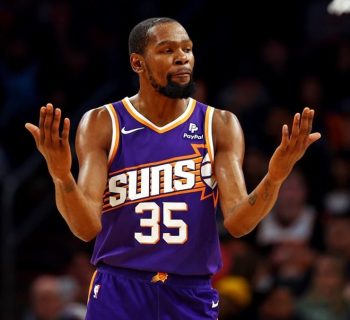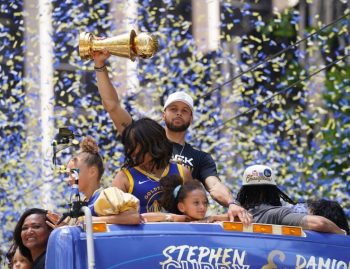NBA
NBA AM: What Is The Right Value For A Trade?

What Is He Worth?
As the NBA trade season starts to ramp up this week, there are a few names that will get a little more play in the rumor mill than most. But defining their trade value may be harder than you think, mainly because of their contract status or the season they are having.
DeMarcus Cousins, Sacramento
Let’s start here. DeMarcus Cousins is not asking for or seeking a trade, and the Sacramento Kings are not fielding or talking to teams about a trade involving Cousins. That’s where you have to start with this situation.
There is a reality looming over the marriage of Cousins and the Kings: The Kings are still not contending, and Cousins’ contract is running out.
Cousins becomes an unrestricted free agent in roughly 565 days. The Kings are sitting at 9-15 (.375). The good news is that’s three games out of the eighth seed in the West, but that’s still not good basketball.
The story around the NBA is pretty consistent. At some point, the Kings have to face the reality that Cousins will hit the open market, and history has not been kind to non-winning teams with top level free agents.
Cousins says all the right things when asked about trades. The Kings say all the right things when teams call trying to pry Cousins out of Sacramento. They are both trying to keep the marriage in a good place (which it is), but there is a reality to all of it.
The Kings have listened over the last year to what has come in regarding offers and ideas, and while there are a few teams that would unload a lot to get Cousins for the next year and six months, none of it is equal value for what Cousins is to the Kings right now.
Kings ownership is unwilling to give away arguably the top center in the game for what amounts to a handful of young guys and the promise of future draft picks that amount to a handful of magic beans. Sure, the Kings could land someone new in the draft, but they are invested in Cousins and believe the best scenario for them is to build around him, even if there is risk somewhere down the road.
As one source close to the situation said recently, “If you know the return is bad, why make the deal?” And the Kings know the return is bad.
There is little doubt that the Kings could move Cousins tomorrow if they wanted to. They could get some young guys, some expiring contracts and draft picks, but frankly and honestly, the Kings know that won’t help them in the short-term – not nearly as much as having an All-Star center to build around for another year and seeing where things land.
Maybe the Kings get less in a year if they opt to trade Cousins at a later date. Their view is they’d get less for him now, so what’s the difference.
That’s the problem in trying to extract value for a star-level talent at the end of his contract.
Greg Monroe, Milwaukee
The Milwaukee Bucks and Greg Monroe have not been a very good pairing. Monroe is now a fixture on the Bucks’ bench, and that does not look to be changing anytime soon.
The Bucks tried pretty aggressively to find a trade for Monroe last year, and all through the offseason it was said the Bucks were not looking for much for Monroe, hoping to free up the cap space and a roster spot.
The problem for the Bucks, and to a certain extent for Monroe, is that his contract is a tough one to move.
Monroe holds a player option for next season worth $17.8 million. Ultimately, it’s his choice whether to stay in this deal or opt to explore the market for a longer-term deal. Few around the league expect Monroe to command more than the $17.8 million he’s owed, but would he cash that in for a new multi-year deal with a better fitting team?
The problem for the Bucks is this: Teams that would want Monroe as a straight up rental would pay one price in a trade knowing he likely walks in July. There are teams that would entertain that.
The other side of that are the teams that would want Monroe beyond this current year. Unless Monroe opts into that final year, there is risk for those teams that see Monroe as a longer-term option. It’s the unpredictability that kills the market for Monroe.
The belief is the asking price on Monroe is not very high, and with the Bucks still middling in the East at 11-12, there is a sense that moving Monroe would be more likely than not, even if the return is fairly low.
Milwaukee does have to weigh their options, because moving off $17 million in contract money is not easy without taking some contract money back in return. The last thing the Bucks want to do is litter their future flexibility with a bad contract, so the difficulty in finding the right mix of value, cap flexibility, and a team willing to play both sides of Monroe’s contract is why Monroe is still in Milwaukee. Maybe that changes as the trade market gets underway, but finding that balance is no easy task.
Mario Hezonja, Orlando
The Orlando Magic are one of the teams to watch in terms of an early trade. The team is better in some ways than they were four weeks ago, but they are still struggling on offense, and there is a growing sense they will be aggressive in trying to snag a scoring threat in a trade.
The Magic have some assets they can move. Center Nikola Vucevic is no longer a focal point for the team and is on one of the more favorable team-friendly contracts in the NBA. The Magic are highly invested in other players in the front court that match their defensive mindset, and Vucevic seems to be the odd-man out.
The Magic still hold some favorable draft picks, not only from their cache of picks but from picks they have acquired in trades.
The Magic have some youth in guard Elfrid Payton, who has been relegated to the bench by head coach Frank Vogel. They have the all-energy tweener in Aaron Gordon and they have last year’s fifth overall pick Mario Hezonja, who is not even seeing playing time.
Hezonja is the interesting one because his camp is growing frustrated with his lack of a role and there is growing pressure to either find a role for him or find him a new home. The Magic like Hezonja a great deal, but they are trying to win games and Hezonja has regressed a great deal this year, so much so that the coaching staff won’t put him in games despite a need for scoring.
The Magic have been sniffing around the league doing early due diligence on trades, so it’s likely they trigger something sooner than later, but the question becomes: What do the Magic get in return?
Hezonja’s value could not be any lower given his 3.8 points per game average and downright dreadful 3.41 PER. Had Hezonja posted a monster rookie year he might hold more value, but even as a rookie Hezonja job-shared, logging just 17.9 minutes per game and averaging 6.1 points. There were some flashes, but hardly the sustained presence that could command a lot in return.
The Magic have eyes on a postseason run and something more than just eighth seed fodder this year. To reach that goal, the Magic clearly will need more than they currently have. The question becomes, what can they really move and what kind of value does it return?
Stanley Johnson, Detroit
Like Hezonja in Orlando, Detroit’s Stanley Johnson has fallen out of the picture for the Pistons. The situation is a little different because Pistons coach Stan Van Gundy would like to use Johnson more, he just has not been nearly as effective as the team hoped coming into the season.
The Pistons recently sent Johnson to the D-League to get him some extended minutes and a chance to play his way out of the funk he’s been in for most of the season. Johnson delivered a huge 26-point, five-rebound and four-assist showing in his first D-League game. Johnson returned to the Pistons for their matchup against the 76ers on Sunday but didn’t necessarily bring the magic back with him.
The Pistons are in a tough spot because they genuinely believe in Johnson’s potential, but they can’t afford to waste game minutes if Johnson is going to struggle, especially defensively.
Sources close to the situation say the Pistons are not ready to give up on the promise of Johnson, but they may have to consider other options if Stanley can’t turn the corner.
Johnson said he is open to shuttling back and forth between the NBA and the D-League every so often to get extended minutes, which is smart, because if he can’t get minutes for the Pistons at least he keeps his value up if they opt to move in a new direction.
Monta Ellis, Indiana
As if things were not bad enough for Pacers guard Monta Ellis this year, he’s been ruled out for the next four games due to a groin injury and will not travel with the team.
Ellis has posted a gruesome season so far, notching the second-lowest scoring average of his career at 9.7 points game. Ellis’ assists are down, his steals are down and his PER is by far the worst of his career at 9.61.
To make matters worse, Ellis has three years left on his deal: $10.76 million this season, $11.27 million next season and a player option in the 2018-2019 season worth $11.69 million.
It is becoming clear the Pacers are a much better team without Ellis, which is why his name is mentioned so frequently in trade talk. The problem for the Pacers is, who trades for him given the situation? He is injured, owed a ton of money and not producing. Any one of those scenarios kills a possible trade, but Ellis may have the trifecta of deal-killing circumstances.
There is a belief that Ellis has not been right physically all year, and that the decision to leave him home for the next six days isn’t just about giving him time to heal, but to give him a chance to re-focus as well.
The Pacers are one of the teams right there in the Eastern Conference hunt, so every game matters. If the Pacers continue to play well without Ellis, it gets easier and easier to justify a trade. The problem is that Ellis may have very little trade value given all the circumstances of his situation.
While these are by no means the only names we’re going to hear about over the coming weeks, these are some of the names we’re talking about now and there will be more to come.
More Twitter: Make sure you are following all of our guys on Twitter to ensure you are getting the very latest from our team: @stevekylerNBA, @AlexKennedyNBA, @MikeAScotto, @LangGreene, @EricPincus, @joelbrigham, @SusanBible, @TommyBeer, @MokeHamilton, @jblancartenba, @OMaroneyNBA, @Ben_Dowsett, @ JabariDavisNBA and @CodyTaylorNBA .













